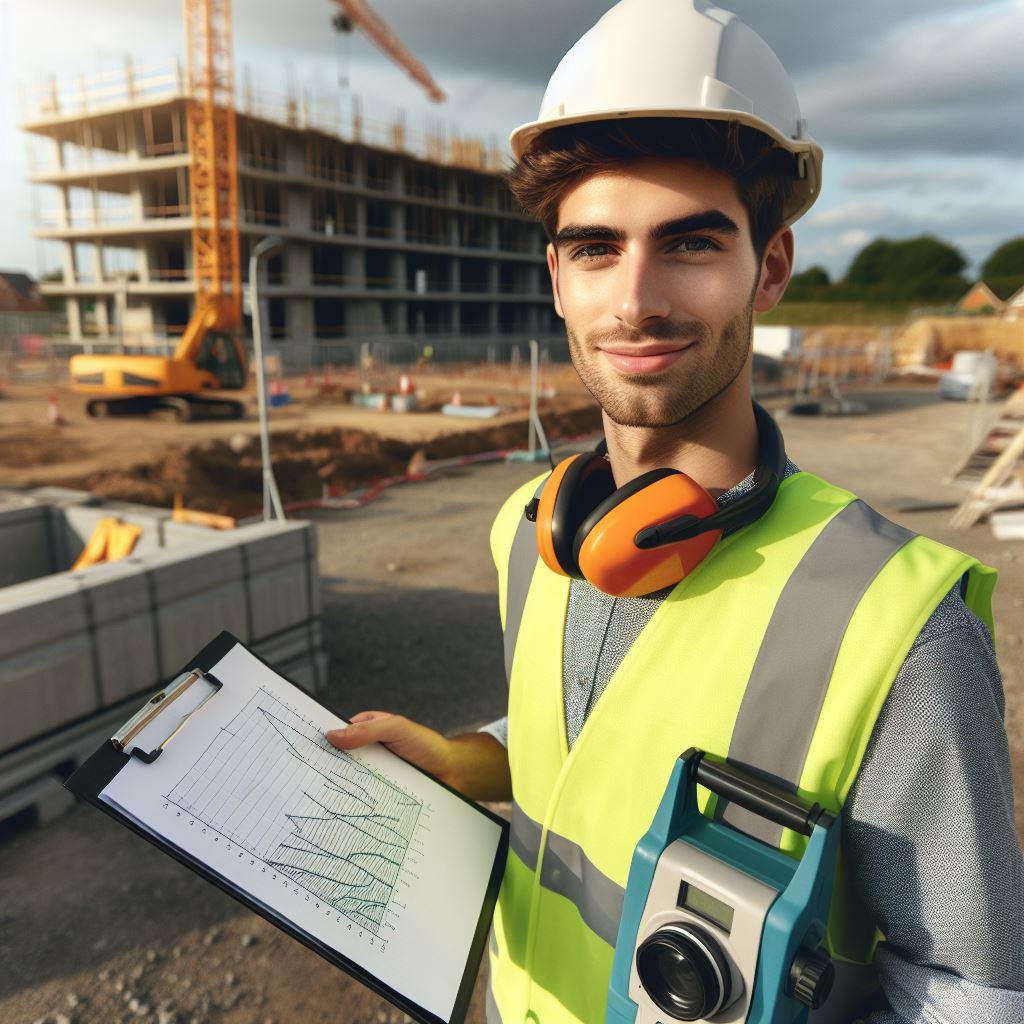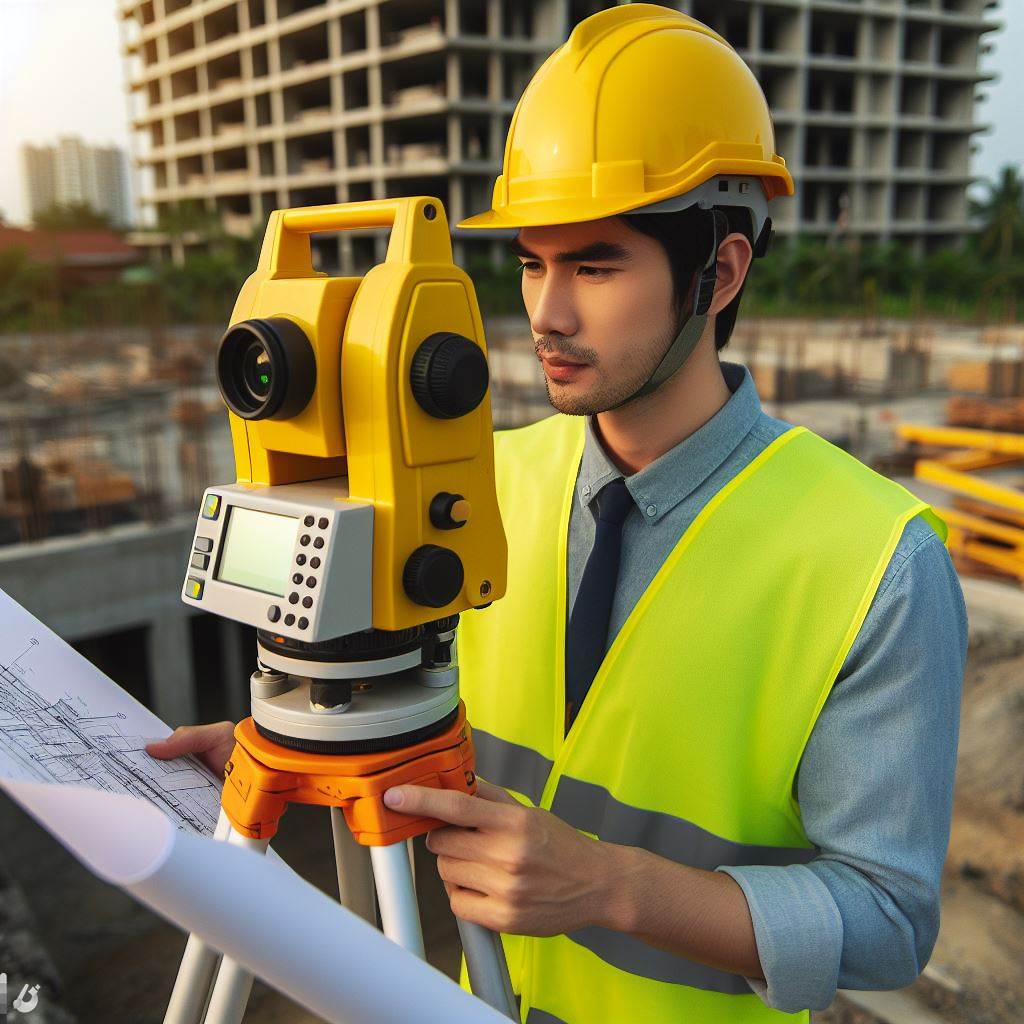Introduction
UK Building Surveyors play a crucial role in the construction industry, ensuring projects are executed smoothly.
This blog post aims to shed light on their duties, challenges, and the significance of their contributions.
Surveyors are vital for ensuring compliance with building regulations, conducting inspections, and offering expert advice.
Their expertise helps in identifying and resolving potential issues before they become costly problems.
The purpose of this blog post is to explore the multifaceted responsibilities of UK Building Surveyors and highlight the obstacles they face.
Additionally, it aims to emphasize the importance of their roles in maintaining construction standards and ensuring the safety and quality of buildings.
Overview of UK Building Surveyors
In this blog section, we will explore the role of building surveyors in the UK, their qualifications, and the various sectors they work in.
What are Building Surveyors and What They Do
Building surveyors are professionals in the construction industry who specialize in assessing and inspecting buildings.
They provide expert advice on both residential and commercial properties.
- Building surveyors evaluate the condition of buildings and identify any defects or potential issues.
- They conduct surveys and produce reports detailing their findings, including recommendations for repairs or renovations.
- In addition to inspections, building surveyors also handle property valuations, project management, and provide legal advice.
Educational and Professional Qualifications
Becoming a building surveyor requires a certain level of education and professional qualifications.
- A bachelor’s degree in building surveying or a related field is the minimum educational requirement.
- Most building surveyors pursue further education to obtain a master’s degree, which enhances their expertise.
- Additionally, aspiring building surveyors need to complete a period of professional training and gain hands-on experience.
- After completing the required training, they can apply for professional membership with industry bodies such as RICS (Royal Institution of Chartered Surveyors).
Building Surveyors’ Work Sectors
Building surveyors work across various sectors, providing their expertise to clients in different industries.
- Residential sector: Building surveyors assess the condition of residential properties, including houses and apartments, for homeowners, tenants, or property developers.
- Commercial sector: They inspect and evaluate commercial buildings such as office spaces, retail stores, and industrial warehouses.
Their findings help clients make informed decisions about property investments. - Industrial sector: Building surveyors play a crucial role in assessing and maintaining industrial facilities, such as factories and manufacturing plants.
They ensure compliance with safety regulations and identify potential risks. - Public sector: Building surveyors also work in the public sector, carrying out surveys on government-owned properties, schools, hospitals, and public infrastructure to ensure safety and functionality.
- Consultancy sector: Many building surveyors work independently or as part of consultancy firms, providing expert advice to clients on various construction-related matters.
In general, building surveyors play a vital role in the UK construction industry.
Their expertise in assessing and inspecting buildings is invaluable in ensuring the safety and functionality of various types of properties.
With the necessary educational qualifications and professional experience, building surveyors can make a significant contribution to the built environment.
Read: Networking for Civil Engineers in the UK
Duties of UK Building Surveyors
Building surveyors play a crucial role in the construction industry in the UK.
They are responsible for a range of duties that contribute to the successful completion of building projects and the ongoing maintenance of existing structures.
Let’s take a closer look at the primary duties and challenges faced by UK building surveyors:
Primary Duties and Responsibilities
- Building surveyors are responsible for conducting surveys and inspections of both residential and commercial properties.
- They assess the condition of buildings, identify any defects or potential risks, and provide recommendations for maintenance or repairs.
- Building surveyors also play a vital role in ensuring that construction projects comply with all relevant building regulations and health and safety standards.
- They review plans and specifications to ensure their feasibility and compliance with building codes.
- Building surveyors are also involved in the planning and implementation of building projects, working closely with architects, engineers, and contractors.
- They provide expert advice on building-related matters to clients, offering guidance on cost management, sustainability, and energy efficiency.
Role in Property Inspections and Assessments
- Building surveyors have the responsibility of conducting thorough inspections of properties before their purchase, sale, or lease.
- During these inspections, they identify potential defects or risks that could affect the value or safety of the property.
- They assess the structural integrity, condition of the building fabric, and the presence of any environmental hazards.
- Building surveyors also inspect and evaluate the performance of building systems such as electrical, plumbing, and HVAC.
- Based on their assessments, they provide clients with detailed reports outlining the findings and recommendations for necessary actions.
Identifying and Assessing Potential Risks or Defects
- One of the critical tasks of building surveyors is to identify any potential risks or defects in buildings.
- They use their expertise and knowledge to assess the structural stability and integrity of buildings.
- They examine the materials and construction methods used, looking for any signs of deterioration or inadequate workmanship.
- Through thorough inspections, building surveyors can identify issues such as dampness, subsidence, or insulation deficiencies.
- They also assess for any potential health and safety hazards that could arise from the building design or materials used.
Preparing Technical Reports and Recommendations
- Building surveyors are responsible for preparing comprehensive technical reports based on their inspections and assessments.
- These reports outline the findings, including any defects or risks identified, along with their recommendations for remedial actions.
- They liaise with clients to ensure they understand the reports and provide guidance on the most appropriate course of action.
- Building surveyors also prepare cost estimates for repairs or maintenance work, ensuring clients have accurate information for decision-making.
- They may be required to testify as expert witnesses in legal cases related to building defects or disputes.
In short, building surveyors play a crucial role in the construction industry by conducting property inspections, identifying risks and defects, and providing recommendations for maintenance or repairs.
Their technical expertise and knowledge contribute to the safe and efficient operation of buildings in the UK.
Read: Internships in UK Civil Engineering

Gain More Insights: Famous UK Civil Engineers & Their Legacy
Challenges Faced by UK Building Surveyors
Building surveyors in the UK deal with various challenges on a regular basis that can greatly impact their work.
In this section, we will discuss some of the common challenges they commonly face.
Tight Deadlines and Multiple Projects
One of the biggest challenges for UK building surveyors is working within tight deadlines while managing multiple projects simultaneously.
Due to the high demand for their services, building surveyors often find themselves juggling multiple projects, which can be extremely demanding and stressful.
Personalized UK Career Consulting
Receive tailored career guidance designed just for you. Get actionable steps and expert support to boost your career in 1-3 days. Take control of your career now.
Get StartedIt is crucial for building surveyors to have excellent time management skills and the ability to prioritize tasks effectively.
They must be able to allocate time and resources efficiently to ensure that all projects are completed within the specified deadlines.
Keeping Up with Changing Building Regulations
Another significant challenge for building surveyors in the UK is the need to constantly keep up with changing building regulations and legislation.
Building regulations are regularly updated to improve safety standards, energy efficiency, and environmental sustainability.
Building surveyors must be up-to-date with these regulations to ensure that the projects they work on comply with the latest standards.
Failure to comply with the regulations can result in legal issues and delays in project completion.
Meeting Client Expectations and Satisfaction
Building surveyors face challenges in meeting client expectations and ensuring their satisfaction.
Each client may have unique requirements and preferences, making it essential for surveyors to understand and address their specific needs.
Effective communication is key in this regard, as building surveyors need to clearly understand client expectations and provide regular updates on project progress.
They must also be able to manage client feedback and concerns in a professional manner to maintain a positive client relationship.
Dealing with Technical and Complex Issues
UK building surveyors often encounter technical and complex issues during their work.
These can range from structural problems to the discovery of hazardous materials or hidden defects within buildings.
To tackle these challenges, building surveyors require in-depth knowledge and expertise in various areas.
They must be able to analyze complex problems and provide practical solutions that adhere to regulations and standards.
Managing Health and Safety Risks
Health and safety risks pose another challenge for UK building surveyors.
They must ensure that construction sites and buildings are safe for workers and occupants throughout the project’s duration.
Surveyors need to identify potential risks and hazards, conduct thorough inspections, and implement appropriate control measures.
Health and safety regulations must be strictly followed to prevent accidents and injuries during construction and beyond.
In fact, UK building surveyors face a range of challenges in their everyday work.
From managing tight deadlines to keeping up with changing regulations and meeting client expectations, their role requires excellent skills and expertise.
By actively addressing these challenges, building surveyors can deliver high-quality services and ensure successful project outcomes.
Read: How Brexit Affects UK Civil Engineering
Skills Required for UK Building Surveyors
Building surveyors play a crucial role in the construction industry, ensuring that buildings are safe, compliant with regulations, and meet the needs of their occupants.
To excel in this field, building surveyors need a combination of technical knowledge and soft skills.
Here are the essential skills and qualities required to become a successful building surveyor in the UK:
Technical Skills
- Knowledge of construction materials: Building surveyors must be familiar with different types of construction materials and their properties.
- Understanding of building codes and regulations: Keeping up-to-date with building codes and regulations ensures compliance and safety in construction projects.
- Inspection techniques: Building surveyors need to be skilled in conducting thorough inspections to identify potential issues or defects in buildings.
- Ability to assess structural integrity: Evaluating the structural integrity of buildings requires a solid understanding of engineering principles and construction techniques.
- Proficiency in using surveying equipment: Building surveyors should be adept at using a variety of surveying equipment and tools to measure and assess buildings accurately.
Soft Skills
- Excellent communication: Effective communication skills are essential for building surveyors to interact with clients, contractors, and other professionals.
- Problem-solving abilities: Building surveyors must be able to analyze complex issues and develop practical solutions to ensure smooth project execution.
- Attention to detail: Paying meticulous attention to detail helps building surveyors identify potential problems and propose appropriate solutions.
- Time management skills: Managing multiple projects and deadlines requires building surveyors to be organized and efficient in their work.
- Strong analytical skills: Building surveyors need to analyze data, interpret technical drawings, and make informed decisions based on their findings.
- Negotiation skills: Building surveyors often need to negotiate contracts, terms, and prices with clients, suppliers, and contractors.
- Client relationship management: Developing and maintaining positive relationships with clients is crucial for repeat business and referrals.
- Ability to work in a team: Building surveyors often collaborate with architects, engineers, and other professionals, requiring strong teamwork skills.
- Adaptability: The construction industry is dynamic, and building surveyors need to adapt to changing technologies, regulations, and project requirements.
- Ethics and professionalism: Upholding high ethical standards and maintaining professionalism is essential for building surveyors to gain trust and credibility.
In essence, becoming a successful UK building surveyor necessitates a range of technical skills and soft skills.
These professionals need a solid foundation in construction, codes, and inspection techniques, in addition to possessing excellent communication, problem-solving, and attention to detail skills.
By combining these skills, building surveyors can excel in the ever-evolving construction industry.
Read: UK Civil Engineering: Challenges & Solutions
Your Dream Job Starts with a Perfect CV
Get a tailored CV and cover letter that captures your unique strengths and stands out in your industry. Let us help you make an unforgettable first impression.
Get StartedConclusion
Building surveyors play a vital role in ensuring the proper maintenance and safety of structures.
They are responsible for assessing the condition of buildings, identifying potential issues, and providing recommendations for repairs or improvements.
Throughout this blog post, we have discussed the various duties and challenges faced by UK building surveyors.
From conducting inspections and surveys to overseeing construction projects and addressing compliance issues, the scope of their responsibilities is vast.
Building surveyors are instrumental in maintaining the integrity of structures, ensuring they are safe for occupancy and fit for their intended purpose.
By identifying potential problems early on, they help prevent costly repairs and potential accidents.
The significance of building surveyors cannot be overstated.
Their expertise and knowledge are crucial in preserving the quality and safety of buildings.
They serve as a bridge between construction professionals, homeowners, and authorities, ensuring that buildings meet regulatory standards and operational requirements.
If you are considering a career in the construction industry, building surveying can be an excellent option. This profession offers a diverse range of opportunities and challenges.
Building surveyors enjoy a dynamic work environment where they can contribute to the development and maintenance of our built environment.
All in all, building surveyors are essential for maintaining the integrity and safety of structures.
Their duties are varied, and their work plays a vital role in ensuring the longevity and functionality of buildings.
Consider building surveying as a rewarding and impactful career option.
[E-Book for Sale]
500 Cutting-Edge Tech Startup Ideas for 2024 & 2025: Innovate, Create, Dominate
$19.99 • 500 Tech Startup Ideas • 62 pages
You will get inspired with 500 innovative tech startup ideas for 2024 and 2025, complete with concise descriptions to help you kickstart your entrepreneurial journey in AI, Blockchain, IoT, Fintech, and AR/VR.




